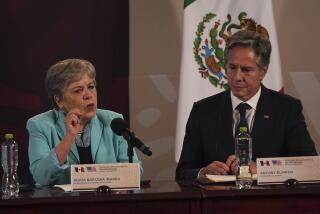A Brazil That Can Say No
Given Brazil’s size, population and growing economic strength, Secretary of State Condoleezza Rice’s talk of the need for a more “strategic relationship” between Brazil and the United States was only a belated recognition of reality. Although Mexico, for its proximity, size and history, will remain the No. 1 U.S. priority in Latin America, Brazil rightly deserves the No. 2 position. Rice, with her visit there last month, confirmed the Bush administration’s intent.
The relationship between Brazil and the United States (and between President Bush and the Brazilian president, Luiz Inacio Lula da Silva) is interesting in part because it is so unexpected. Less than three years ago, the Bush administration and foreign investors were alarmed at the prospect that Lula -- then seen as a populist, anti-free-market, anti-American firebrand -- would become president of Brazil. Lula surprised the world after he took office, following orthodox market-oriented policies to keep the budget under control. Brazil averted default on its financial obligations, and its credit in the international markets has been restored.
The nation’s economic reforms are far from finished, but the Brazilian leader has at least managed to negotiate with his legislative branch a set of badly needed tax and pension reforms.
Even as Lula’s domestic policies have reassured Wall Street, however, his foreign policies have often put him at odds with the Bush administration. On the trade front, Brazil led a bloc of developing countries in 2003 in protesting further trade liberalization until rich nations dismantled their agricultural subsidies. And Lula has also opposed Washington’s plans for a free-trade agreement for the Americas that seeks to extend NAFTA to Patagonia.
Then there are Lula’s troubling friendships with dictator Fidel Castro of Cuba and would-be dictator Hugo Chavez of Venezuela. If Lula wants to be regarded as a responsible hemispheric leader, he should distance himself from Castro’s human rights abuses and Chavez’s undemocratic tactics. His support of both leaders does him little good with anyone beyond his most fiery leftist supporters.
Still, it is past time for the U.S. to accept that Brazil will sometimes have interests and goals at odds with those of Washington. To do so would simply be to acknowledge the maturing nature of one of the most important political relationships in the hemisphere.
As part of that relationship, the U.S. should encourage Brazil in its nascent regional leadership. In Haiti, Brazil has led the U.N. military contingent that has at least kept the impoverished nation from exploding in violence. And even as he resists the Bush administration’s overtures on a larger American free-trade agreement, Lula has worked to broaden the scope of Mercosur, a trade alliance among Argentina, Brazil, Paraguay and Uruguay, by negotiating an agreement between Mercosur and the European Union.
Lula has made no secret of his desire for Brazil to take a role on the larger world stage. One of his campaigns is to attain a permanent seat on the U.N. Security Council as the world body tries to rebalance the membership of that powerful group. (Germany, Japan and India also seek permanent seats.)
Whatever happens at the United Nations, the U.S.-Brazil relationship will continue to be tested. As Peter Hakim of the Inter-American Dialogue, a Washington-based policy center, put it: The issue is not whether Brazil and the United States can find areas of agreement, but how they accommodate each other when they disagree. Lula and Bush both have something to prove by swallowing a little pride.
More to Read
Sign up for Essential California
The most important California stories and recommendations in your inbox every morning.
You may occasionally receive promotional content from the Los Angeles Times.










